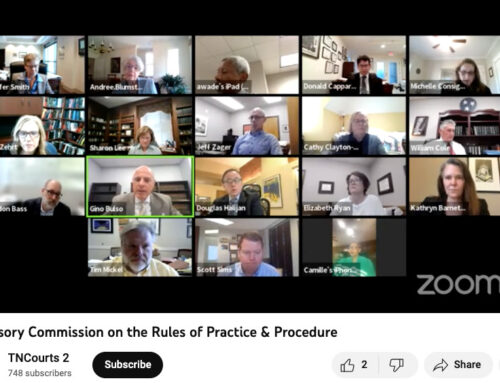Citizen wins attorneys fees in Chattanooga Open Meetings case
Chancellor Pamela Fleenor on Friday issued an order awarding attorney fees, expenses and other costs to citizen Helen Burns Sharp who sued the city of Chattanooga’s industrial development board over a Sunshine Law violation.
The order in the Chattanooga Open Meetings case means the industrial development board could pay a large chunk of Sharp’s legal bills, which have grown to roughly $89,000 with a second lawsuit filed earlier this month.
Sharp won her initial case in July when Hamilton County Chancellor Frank Brown ruled that the industrial development board violated the Open Meetings Act by deciding to finalize tax-increment financing to a developer building a golf course community without holding a public meeting to vote on the matter. Part of what the industrial board had to consider was whether the developer qualified for this type of tax subsidy under the law.
At the time, Judge Brown did not award attorneys fees. Brown is no longer on the bench after deciding not to run again, and Fleenor, who was recently elected, took over the case.
Sharp has been paying her monthly legal bills with her own money, and has been able to raise $12,000 in contributions to defray some of her costs, she said. But the amount has been staggering and she said an award of at least some of the fees will help tremendously, as well as allow her the financial wherewithal to continue with her second lawsuit.
Fleenor said in her opinion that Sharp is entitled to “reasonable expenses incurred, including her reasonable attorneys fees, for establishing the truth of the IDB’s denial that it had violated the Open Meetings Act when granting the TIF.”
Sharp was able to get the award of fees using Rule 37 of the Tennessee Rules of Civil Procedure. During discovery, Sharp had filed a “Request for Admission” that asked the IDB to admit that “After the IDB received the Second Qualified Masterson Letter, private meetings and deliberations occurred among and between the directors on the IDB and the IDB attorney regarding the Unqualified Opinion Letter Requirement and whether additional public meetings would be conducted relative to closing discussion on the satisfaction of that Requirement.”
The “unqualified opinion letter” was an attorney’s opinion as to whether the project qualified for tax-increment financing under the law.
Sharp also asked the IDB to admit that the “IDB conducted private meetings, during which the directors of the IDB decided to approve and/or execute the Loan Documents.”
IDB did not admit to the secret deliberations and non-public meetings, yet the court later found that it did have these meetings in violation of the Open Meetings Act.
Rule 37 allows for attorney’s fees and costs to be paid by a party when the party “fails to admit the genuineness of any document or the truth of any matter … if the party requesting the admission thereafter proves the genuineness of the document or the truth of the matter.”
The industrial development board argued that “Brown’s ruling was a novel first impression interpretation of the requirements of the Open Meetings Act” and it did not admit to violations because it had “reasonable grounds to believe it might prevail on the matter.”
But Fleenor wrote in her ruling:
“Here however, IDB denied it violated the Open Meetings Act. Whether a violation of the Open Meetings Act occurred is not a novel question of first impression… Moreover, whether a violation of the Open Meetings Act occurred is not a complex issue of law. A valid open meeting, requires that the public be given advance notice, that minutes of the meeting be recorded and available for public inspection, and, that if any votes are taken, the votes shall be by public ballot or by vocal expression of “aye” or “nay” and the result of those individual votes are to be recorded… It is not difficult to determine whether an open meeting occurred or whether a secret meeting in violation of the act occurred. It is simply a question of fact.”
“…it is clear from this Court’s Order of July 16, 2014, that this Court determined that secret meetings, in violation of the Open Meetings Act, occurred in IDB’s granting the TIF, and as a result of the violation, this Court declared the IDB’s resolution granting TIF null, void and of no legal effect.”
Sharp’s attorney, John Konvalinka with Grant Konvalinka & Harrison, P.C., will have to file paperwork on the fees for reimbursement, so the exact amount is not yet clear. But based on Sharp’s bills after the Request for Admission was filed, it could run as much as $50,000 to $60,000, or more. Through August, Sharp has incurred $89,607 in legal bills in fees including from the second lawsuit, she said.
Sharp’s second lawsuit alleges that the industrial board’s attempt in August to “cure” its violation by voting to ratify its earlier decision was perfunctory, and did not involve substantial reconsideration of the issue. In addition to another allegation of an Open Meetings violation, the lawsuit raises new issues, including that one of the board members is ineligible because he is not a resident of Chattanooga.
The Times Free Press in Chattanooga has covered the story extensively, and more can be read at “City loses second round in legal fight over development board violations.”





